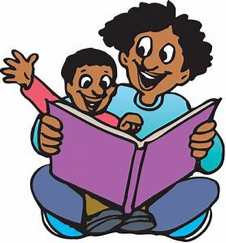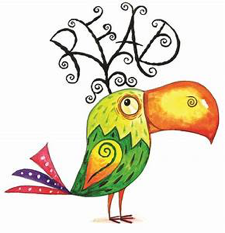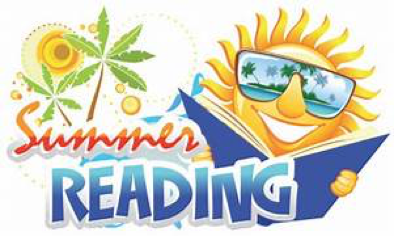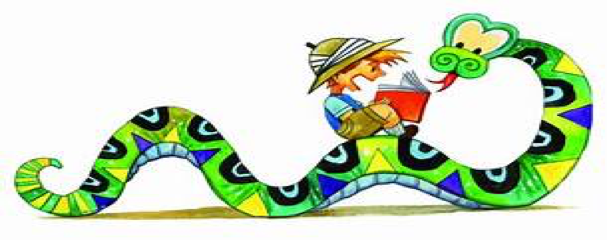 Children acquire skills throughout the school year, but they can lose ground if learning stops during the summer break. Fortunately, learning never has to stop. Children who read throughout the summer gain skills, can start the new school year with a better understanding of language and the world around them, and discover the joy of reading. The more they like to read, the more they will read.
Children acquire skills throughout the school year, but they can lose ground if learning stops during the summer break. Fortunately, learning never has to stop. Children who read throughout the summer gain skills, can start the new school year with a better understanding of language and the world around them, and discover the joy of reading. The more they like to read, the more they will read.
It’s not hard to help your children keep their interest in reading and learning. Children learn through a variety of activities, and almost everything we do presents an opportunity to read. When you’re eating breakfast, read the cereal box; if you’re in a restaurant, read the menu. Read the newspaper with your children and discuss what’s happening in the world.
Reading every day, even if it’s for just a few minutes, improves children’s ability to read and learn all year long. Here are 6 weeks of activities that involve reading and related skills. There’s no special order, and you don’t have to do everything listed in a particular week. Just pick the ones that look interesting and fun!
Week 1: Celebrate summer
- Write a list of things you want to do this summer. Don’t forget to include reading!
- Make a chart to keep track of all the books you read this summer.
- Write down on your calendar the time the sun sets today.
- Start a summer scrapbook. Include souvenirs of any trips you take, photos, ticket stubs, and projects you work on during the summer.
- List all the books by your favorite author. See how many you can read this summer.
- Swap books with a friend. Keep sharing books throughout summer.
- Take a walk. Write about or draw the things you see that show summer is here.
 Week 2: Discover recipes for fun
Week 2: Discover recipes for fun
- List all the ice cream flavors you can think of. Now put them in A-BC order.
- Invent a recipe for a cool summer drink. Write it on a recipe card. Serve the drink to your friends.
- Go to the library and find a cookbook. Make the most interesting dish in the book.
- Read the directions on a box of gelatin. Ask a parent if you can help make dessert tonight.
- Work up an appetite by reading a story about food. Make and eat the food you read about.
- Word game! How many smaller words can you find in the word watermelon?
Week 3: Travel the world
- If you are going on a family vacation this summer, read about your trip. Mark your travel route on a map.
- Pretend you are going to visit another city, state, or country with a friend or relative. Write to the tourist bureau for more information. If you plan to visit a foreign country, write to the embassy. Visit the library and find books about the place you want to visit. Or search online for information. Plan your itinerary – and don’t forget to check the weather!
- Pick an important news event from another city, state, or country. Find as much information on the topic as possible – read newspapers, listen to the radio, and watch TV news. Talk about what you learned.
- Word game! Look for out-of-state license plates. Make a list of all the state names and slogans. Decide which ones you like the best. Ask friends and relatives which are their favorites.
Week 4: Enjoy the great outdoors
- Pick wildflowers and press them between the pages of a heavy book until the end of summer.
- Plan a backyard camping trip with a friend. List all the things you will need to survive.
- Plan a family ‘booknic’ at your favorite outdoor spot, such as the beach, a park, or the woods. Pack lunch and plenty to read.
- Collect shells at the beach or rocks along a trail. Use a nature guide to identify them.
- Find something small enough to put in your pocket. Write or tell a story about it.
- Look for shapes and designs in the clouds. Draw them.
- Word game! Make a list of words to describe fireworks.
Week 5: Visit fun places
- An animal has escaped from the zoo! Make up a story about it. Tell it to a friend or family member – or write it down. Add pictures, if you’d like.
- What museums are close to your house? Are there any old, historic buildings in the area? Find these places on a map. Find out what is on exhibit at the museums and why the old buildings are important.
- Go back in time and pretend you lived in – or did business in – the oldest building in your area. Write a story about how you spent your time.
- Make a list of zoo animals. Sort them by different categories, such as type of animal (mammals, fish, etc.) or coloring (green, brown, striped, etc.).
- Visit the zoo with friends or relatives and find the animals on your list.
- Visit a museum or historical building with friends or relatives. Write a list of things you see that you didn’t expect.
- Word game! Think of the softest animal or the oldest thing you’ve ever touched. Write a poem about it, but don’t use the word soft or old.
- Remember the wildflowers you pressed between the pages of a heavy book? Remove them, and put them in your summer scrapbook or paste them on heavy paper to make a bookmark.
- Review the chart you made to track the books you read this summer. Pick new books to read.
- Notice what time the sun sets today. Compare it to the time the sun set during week one.
- Make a list of the supplies you need for school. Start shopping.
- Plan an end-of-summer celebration. Write a list of the 10 best things you did this summer. Design a menu of your favorite summer treats.
- Word game! Summer days are the longest days of the year. List the longest words you know.
Most important, have fun while reading!
Teacher Librarian – Theresa KEMP
